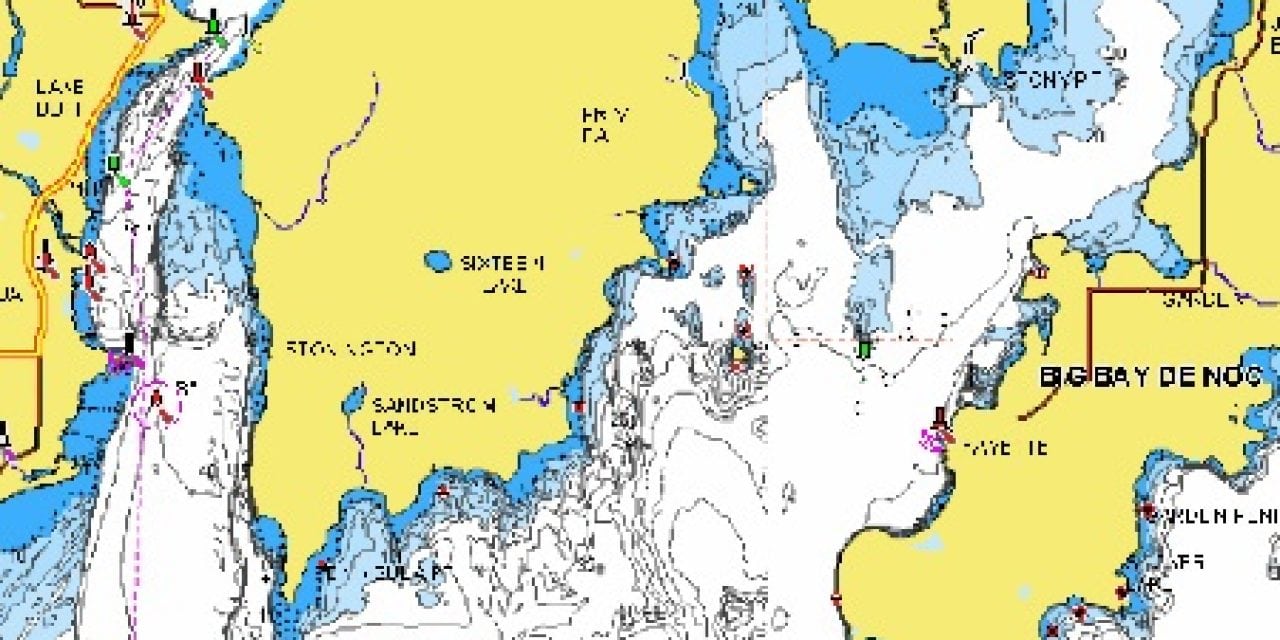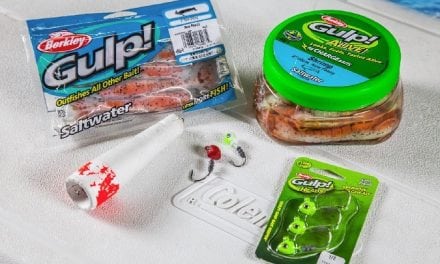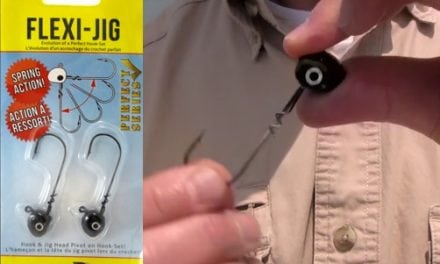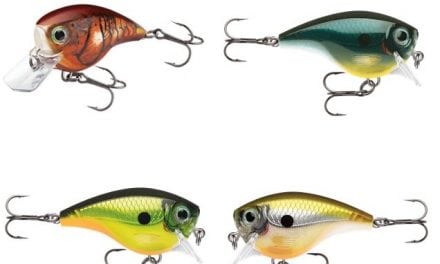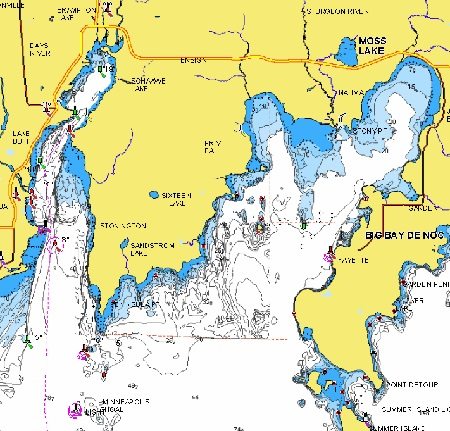 Big and Little Bays de Noc lie at the upper end of Lake Michigan’s Green Bay, and together make up about 100,000 acres of prime sportfishing water. Though many types of gamefish swim these waters, the bays are best known for walleyes—both in numbers and size.
Big and Little Bays de Noc lie at the upper end of Lake Michigan’s Green Bay, and together make up about 100,000 acres of prime sportfishing water. Though many types of gamefish swim these waters, the bays are best known for walleyes—both in numbers and size.
Team Northland member Mark Martin has been a top-ranking angler on elite competitive walleye circuits for years and knows these waters and their walleyes as well as, if not better, than anyone. The bays themselves offer a mixture of cover and structure—weeds, humps, sheer walls and more—and are fairly stained by tannic runoff.
Much of the fishing, especially for trophy-class walleyes, occurs outside the bays, and here the water is ultra-clear due to the filtering activity of zebra mussels.
The Bays de Noc are a mecca for walleye anglers, especially during the summer months. In this Lake-of-the-Week, Martin offers advice on where and how to catch walleyes throughout the open-water season, with a detailed breakdown of what you should be doing from July through early fall.

1. Martin has several suggestions for walleye anglers who plan to fish the bays anytime from early July through early fall. For those who want to focus on catching trophy-class fish, he recommends targeting shoals outside the bays. “This is big-water fishing, for sure,” he says, “but it’s where you’ll catch the biggest walleyes, too.”
Troll Baitfish Spinner Harnesses and Mr. Walleye® Crawler Haulers over and around Peninsula Point, Minneapolis Shoal, as well as the weather station shoal just to the southeast. The shoals at the mouth of Big Bay de Noc are good, too. Combine the ’crawler-baited harnesses with side-planer boards, lead-core line and 1- to 1½-ounce Slick-Stick® Bottom Bouncers, taking care not to drive over the shoals with the boat. “If you run over the fish once or twice in this clear water, you’ll put them down and won’t catch any more,” he warns.
Instead, Martin sends side-planers 150 to 200 feet from his rig and runs the bottom bouncers along the edges and over the top. “The rigs on the off-side of the boat will be in the abyss, but they’ll catch suspended walleyes that are about to move onto the shoal.” He likes the blades to have a brown/gold tinge (Gold Perch) and always starts with No. 4s. “Walleyes of all sizes will eat a No. 4 spinner,” he says. “Start there before switching to No. 6s.”
Along with spinner rigs, Puppet Minnows are in play on the shoals. “After you’ve caught fish trolling, and figure it’s time to move to the next shoal, stop and cast a Puppet Minnow, jigging it down the edges, to try and pick up an extra fish or two. Go with the largest size (1 ounce, 3½ inches) to entice these big fish.”
Anglers can also fish inside the bays and catch many more walleyes, but the average size won’t be nearly as big. “Make no mistake, you can catch trophy-class walleyes in the bays themselves, but for the most part, 20 inches is about as large as you’ll find.”
Martin recommends trolling the spinner rigs mentioned earlier along the weed edges at the north end of Big Bay de Noc. The edge, he says, will be in roughly 14 feet of water and a couple of hundred yards from shore. Run the shore-side side-planers along and just inside the weedline. The off-side baits will strain the main basin for suspended fish.
Tossing jigs, such as Fire-Balls®, Weed-Weasels and Whistlers, along the weed edge is another option. You can tip them with a leech or half a ’crawler, but Martin says something like an Impulse® Jig Crawler or Jig’n Leech will ultimately catch more fish because you won’t have to rebait as often.
 In Little Bay de Noc, focus on sunken humps at the north end, as well as the steep shorelines along the narrows that connects the upper and lower bays. Jigs and spinner rigs are both productive, but because the water there is stained, side-planers aren’t necessary.
In Little Bay de Noc, focus on sunken humps at the north end, as well as the steep shorelines along the narrows that connects the upper and lower bays. Jigs and spinner rigs are both productive, but because the water there is stained, side-planers aren’t necessary.
These patterns and techniques usually hold through the early fall, he says.
2. In October and November, Martin typically plies the same areas as he did during the summer, but the tactics change. “In the late fall, many anglers troll crankbaits, but live bait rigs with big 4- to 6-inch creek chubs and suckers catch fish, too,” he says. “On the shoals outside of Big Bay de Noc, use a ¾-ounce Slick-Stick® or a ½-ounce jig. When you feel a fish pick up the bait, keep just a little bit of pressure on the line. You have to kind of tease them into eating it all the way to the hook.”
3. Michigan’s walleye season opens in mid-May, and from the opener until early June, most of the action centers on the upper ends of both bays. “Walleyes have just come out of the rivers and are scattered over the flats and humps beyond the mouth,” he explains. New weed growth attracts insects, baitfish—and walleyes, so focus fishing efforts there. Dragging jigs or spinner rigs through the young vegetation is a proven tactic, but Martin also recommends pulling a live bait rig that terminates in a Gum-Drop Floater tipped with a leech or minnow.
The post Bays de Noc, Lake Michigan Lake Highlight appeared first on ODU Magazine-North America's #1 Digital Fishing Magazine.

